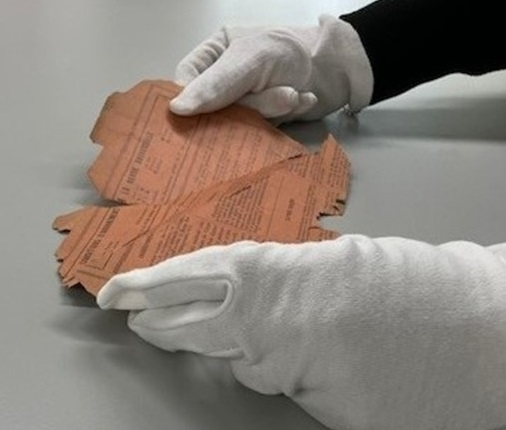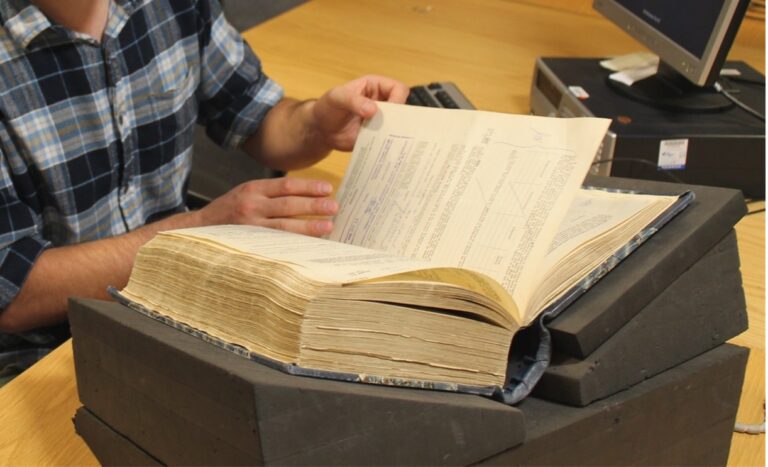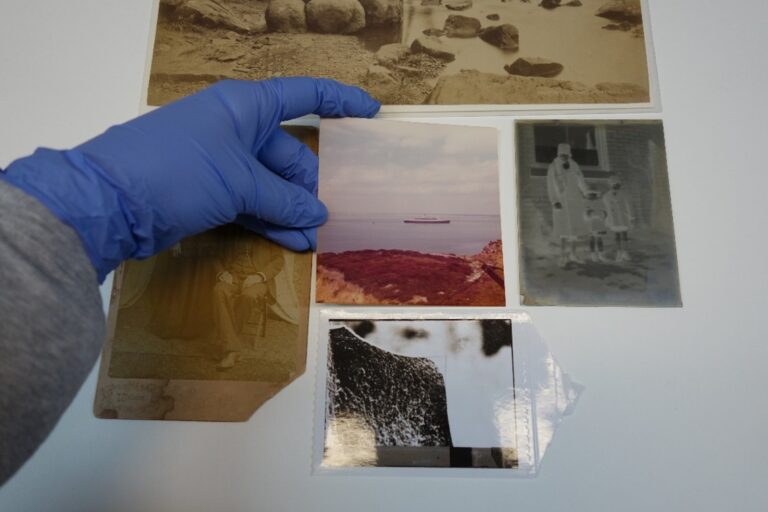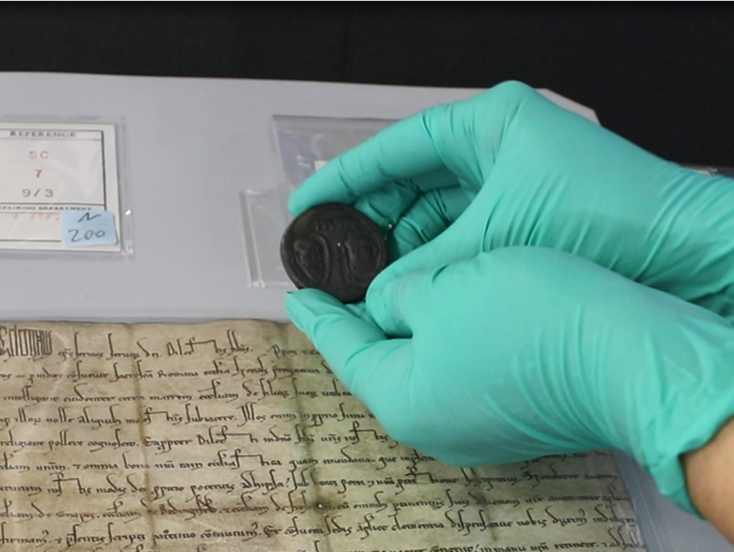The use of gloves in handling historic collections is a question that arises frequently, and certainly divides opinion. In 2013, we published the gloves are off, a blog that outlined our rationale for no longer requiring the wearing of gloves during document handling, something we follow today. Ten years on, we thought it would be useful to outline our approach again.
We received a large response to the change in practice in 2013. Commenters recognising the importance of our historic collections were concerned that by dispensing with gloves, we were putting documents at unnecessary risk. As custodians of more than 1,000 years of history, preservation is at the forefront of what we do. However, preservation is all about balancing risk and so we took this decision based on several things:
1. Our collection
Unlike museums or galleries, The National Archives holds a publicly accessible collection where documents can be handled and viewed in our reading rooms – all handling comes with some risk to the condition.

2. Gloves aren’t straightforward
Though gloves can be used in the handling of object-based collections, they are not suitable for use with all materials. Wearing gloves reduces sensitivity in your fingers, which can be problematic when handling fragile or already-damaged documents. Cotton gloves in particular can catch easily on torn or uneven edges, can transfer dirt between surfaces and do not provide a moisture-proof barrier, all of which can lead to further damage. Additionally, poorly-fitting gloves can make it difficult to handle large or heavy items safely, increasing the risk of accidental damage.

3. Risk Assessment
While some gloves can prevent the transfer of moisture, salts and oils onto the surface of a document during handling, the likelihood of physical damage occurring is increased when gloves are used. The long-term impact of handling without gloves is less significant than the type of catastrophic damage that can be caused or exacerbated by impeded handling whilst using gloves. Overall, we determined that for handling of most collection material, gloves were not required because the risks outweighed the benefits.

There are some circumstances however, where the use of gloves is advised – these are:
4. Handling unhoused photographic materials
These type of documents are sensitive to the moisture, salts and oils in your skin. This includes prints that are not in protective polyester sleeves or fully mounted on board supports, loose negatives, microfilm, or x-rays. Wearing gloves will protect this type of material during handling.

5. Where a barrier may be necessary
Substances that may pose a risk to health can be absorbed through skin or be ingested when handling some documents. The use of gloves is advised when handling non-active mould affected (NAMA) material, lead seals or documents that have been treated with historic insecticides – a recent example of this is series FCO 141. Under these circumstances, we will provide Nitrile gloves for your use.

Gloves do have a role in the safe handling of our collections, but we prioritise good handling practice as the most effective way to protect documents from unnecessary damage. We also ask all those who access collection material to practice good hand hygiene, both before and after handling documents. In this way we aim to ensure continuing access whilst protecting the collection. Risk cannot be completely eliminated, but it can be balanced and by using gloves only when necessary, we are able to achieve this.
Thank for good article
I wish I lived in the U.K. and could regularly visit to see all the interesting exhibits and incredible collections you have.
Should a face mask be worn? Surely the close exhalation of moisture and possibly other detritus from the mouth and nasal passages is a possible damage situation to documents especially over a long period of time?
The National Archives’ collections are publicly accessible and as such, are subject to risks that other types of collections are not. For this reason, we encourage good handling practice, which would include considering safe proximity to the documents. It is also worth bearing in mind that readers are often imaging documents rather than reading them directly, so the likelihood of this type of damage occurring is reduced.
This came up on BBC Radio 4’s Making History some time ago.
https://www.bbc.co.uk/programmes/b03nt8j3
07/01/2014
Making History
Tom Holland and a cast of leading historians join with listeners to discuss the latest historical research. This week, a visit to a holy site in a remote corner of Scotland.
Handling historic documents
Some listeners to Making History were concerned to see Helen Castor, in her recent series for BBC 4, handling the fifteenth century Paston Letters with her bare hands in the British Library. “Shouldn’t she have been wearing gloves”, they ask? According to Sarah Hamlyn Lead Preventive Conservator at the British Library, the answer is “no”. Its produced a video to explain more.
https://britishlibrary.typepad.co.uk/digitisedmanuscripts/2011/08/white-gloves-or-not-white-gloves.html
07/01/2014
Making History
Thank you ~ Certainly a useful article debating ‘should’ or ‘shouldn’t’ we wear gloves when handling archive items. It occurred to me when reading about the wearing of gloves whether of cotton or latex that there could be a method, after thorough washing and drying of hands, that one might dip fingers into a bowl of liquid latex solution that covered digits up to the knuckles which would solidify a thin layer of rubber latex affixed tightly around each finger and thumb ~ and, easily removed when archive handling is completed by pulling off or rolling off the latex rubberised finger ends. Because ‘finger dipping’ had thin layer of latex closely covering fingers sensitivity would be preserved in touching and handling items. Just a thought.
This is a very sensible approach. I applaud your decision. I think that the majority of people that would be doing research in your facility would be well aware of preserving the information and be mindful of what they have in their hands.
An excellent article, informative, well explained rationale and very clear. many thanks
Good advice
VERY INFORMATIVE
Interesting. A couple of weeks ago, I was privileged to visit Salisbury cathedral’s library with my local U3A history group, see a psalter – recently returned following restoration work. The librarian did not wear gloves when touching it, nor did she expect us to.
Given that work on the psalter is believed to have started in 950AD, we were surprised so (very politely) questioned that. The librarian’s explanation was much the same as that given above.
Thank goodness for some common sense – and scientific reasoning behind it all. Nothing is worse than to see people struggling with a large document when they can’t feel what their fingers, unhampered by gloves, could tell them. How many maps have you seen, at the end of books, torn by the careless?
A very sensible and well explained article. I agree with all your points.
Article explained well the rational against Tsing gloves in some circumstances. From a personal viewpoint, I would much rather touch the actual pages with my bare (freshly washed) hands, just so I could feel the history and the historical figures who had touched and signed these documents.